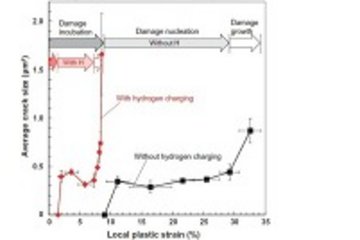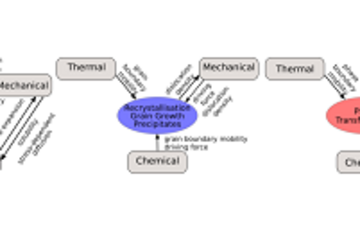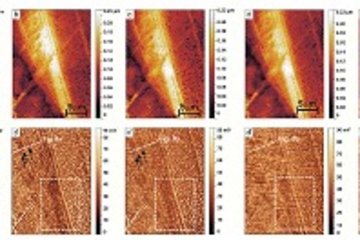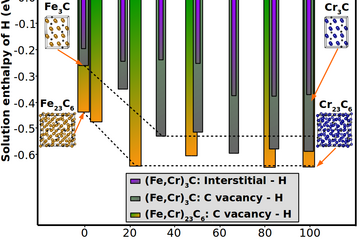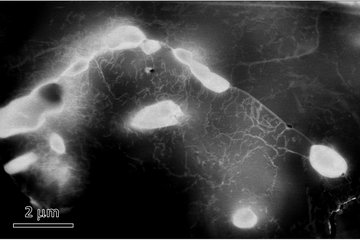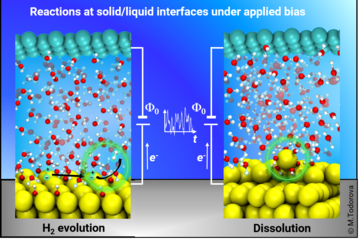All genres
881.
Poster
Size effect in metallic thin films characterized by low-temperature X-ray diffraction. Gordon Research Conference on thin film & smallscale mechanical behavior , Colby College Waterville, Maine, USA (2006)
882.
Poster
Size effect in metallic thin films characterized by low-temperature X-ray diffraction. 55th Annual Denver X-ray Conference, Denver, CO, USA (2006)
883.
Poster
Micron beam bending and compression tests - micromechanical properties of copper. 7th European Symposium on nano-mechanical testing, Hückelhoven, Germany (2006)
884.
Poster
Microstructural investigation of the deformation zone below nanoindents in copper, silver and nickel. Hysitron Workshop and Usermeeting, München, Germany (2006)
885.
Teaching
Mechanische Eigenschaften in kleinen Dimensionen. Lecture: SS 2024, Ruhr-Universität Bochum, June 17, 2024 - June 25, 2024
886.
Teaching
Transmissionselektronenmikroskopie für Fortgeschrittene. Lecture: WS 2024/2025, Ruhr-Universität Bochum, 2024-10 - 2025-03
887.
Teaching
Atomare Charakterisierung von Werkstoffen. Lecture: WS 2024/2025, Heinrich-Heine Universität Düsseldorf, October 26, 2024 - February 12, 2025
888.
Teaching
Mechanische Eigenschaften in kleinen Dimensionen. Lecture: SS 2023, Ruhr-Universität Bochum, June 01, 2023 - June 30, 2023
889.
Teaching
Transmissionselektronenmikroskopie für Fortgeschrittene. Lecture: WS 2023/2024, Ruhr-Universität Bochum, 2023-10 - 2024-03
890.
Teaching
Atomare Charakterisierung von Werkstoffen. Lecture: WS 2023/2024, Heinrich-Heine Universität Düsseldorf, October 26, 2023 - February 12, 2024
891.
Teaching
Mechanische Eigenschaften in kleinen Dimensionen. Lecture: SS 2022, Ruhr-Universität Bochum, June 01, 2022 - June 30, 2022
892.
Teaching
Transmissionselektronenmikroskopie für Fortgeschrittene. Lecture: WS 2022/2023, Ruhr-Universität Bochum, 2022-10 - 2023-03
893.
Teaching
Atomare Charakterisierung von Werkstoffen. Lecture: WS 2022/2023, Heinrich-Heine Universität Düsseldorf, October 26, 2022 - February 12, 2023
894.
Teaching
Mechanische Eigenschaften in kleinen Dimensionen. Lecture: SS 2021, Ruhr-Universität Bochum, April 20, 2021 - July 17, 2021
895.
Teaching
Transmissionselektronenmikroskopie für Fortgeschrittene. Lecture: WS 2021/2022, Ruhr-Universität Bochum, 2021-10 - 2022-03
896.
Teaching
Mechanische Eigenschaften in kleinen Dimensionen. Lecture: SS 2020, Ruhr-Universität Bochum, April 20, 2020 - July 17, 2020
897.
Teaching
Transmissionselektronenmikroskopie für Fortgeschrittene. Lecture: WS 2020/2021, Ruhr-Universität Bochum, 2020-10 - 2021-03
898.
Teaching
Atomare Charakterisierung von Werkstoffen. Lecture: WS 2020/2021, Heinrich-Heine Universität Düsseldorf, October 26, 2020 - February 12, 2021
899.
Teaching
Mechanische Eigenschaften in kleinen Dimensionen. Lecture: SS 2019, Ruhr-Universität Bochum, April 01, 2019 - July 12, 2019
900.
Teaching
Transmissionselektronenmikroskopie für Fortgeschrittene. Lecture: WS 2019/2020, Ruhr-Universität Bochum, 2019-10 - 2020-03





